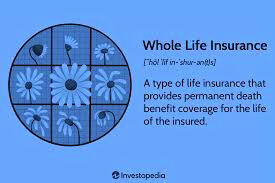Introduction:
When it comes to financial planning and securing your family’s future, whole life insurance is a powerful tool that often gets overlooked. Unlike term life insurance, which provides coverage for a specific period, It offers lifelong protection and comes with a range of benefits that can enhance your financial strategy. In this blog post, we’ll explore the key advantages of whole life insurance, helping you understand why it might be the right choice for you.
What is Whole Life Insurance?
It is a type of permanent life insurance that provides coverage for your entire lifetime, as long as premiums are paid. It combines a death benefit with a cash value component, making it unique compared to other life insurance products.
Key Benefits of Whole Life Insurance
1. Lifelong Coverage
One of the most significant advantages of whole life insurance is the guarantee of coverage for your entire life. No matter when you pass away, your beneficiaries will receive a death benefit, providing them with financial security during a difficult time.
2. Cash Value Accumulation
It policies build cash value over time, which can be borrowed against or withdrawn. This cash value grows at a guaranteed rate, providing you with a reliable source of funds for emergencies, investments, or other financial needs.
3. Fixed Premiums
With whole life insurance, your premiums are fixed and will not increase as you age or if your health deteriorates. This predictability allows for better budgeting and financial planning over the long term.
4. Tax Benefits
The death benefit paid to your beneficiaries is generally income tax-free. Additionally, the cash value growth is tax-deferred, meaning you won’t pay taxes on the gains as long as they remain within the policy. This tax efficiency can be a significant advantage for long-term financial planning.
5. Dividends
Many whole life insurance policies are eligible for dividends. Which can be used to increase your policy’s cash value, reduce your premiums, or be taken as cash. This feature can enhance your overall returns and provide more flexibility.
6. Financial Security for Dependents
It provides a safety net for your loved ones. In the event of your passing, the death benefit can cover living expenses, debts, and future financial obligations. Ensuring that your family remains financially secure.
7. Estate Planning Tool
Whole life insurance can play a crucial role in estate planning. It can provide liquidity to cover estate taxes, ensuring that your heirs receive their intended inheritance without having to liquidate assets.
Is Whole Life Insurance Right for You?
While It offers numerous benefits, it’s essential to assess your individual financial situation and goals. Consider your family’s needs, your long-term financial strategy. Wether the higher premiums associated with whole life insurance align with your budget.
Conclusion
Whole life insurance is more than just a safety net; it’s a strategic financial asset that can provide lifelong coverage, cash value growth, and peace of mind. By understanding its benefits, you can make an informed decision that enhances your financial future and protects your loved ones. If you’re considering whole life insurance, consult with a financial advisor to explore your options and find a policy that fits your needs.
By understanding and leveraging the benefits of whole life insurance, you can make a proactive step towards securing your family’s financial well-being. Start planning today and ensure that your loved ones are taken care of for generations to come!



